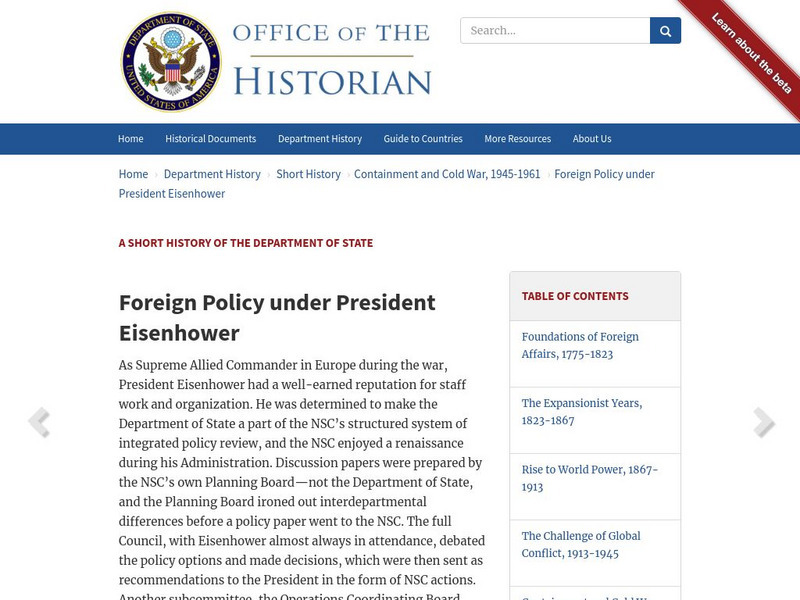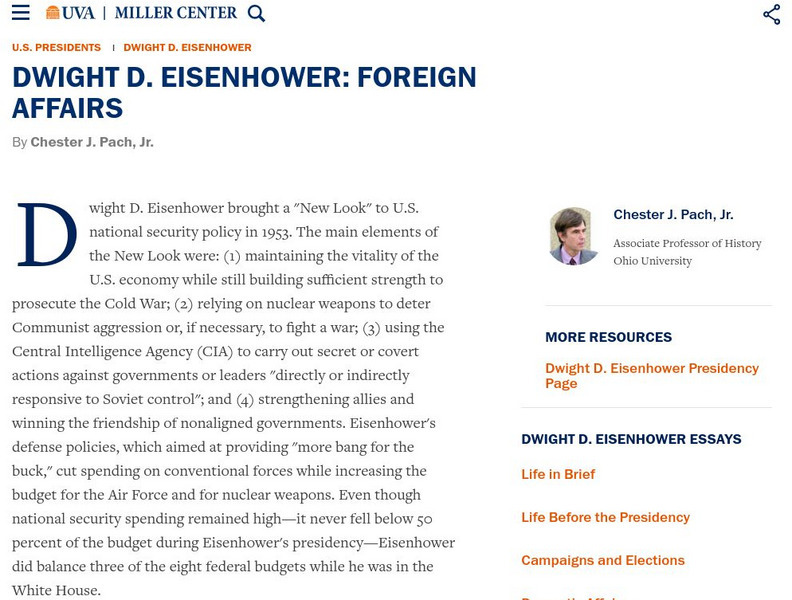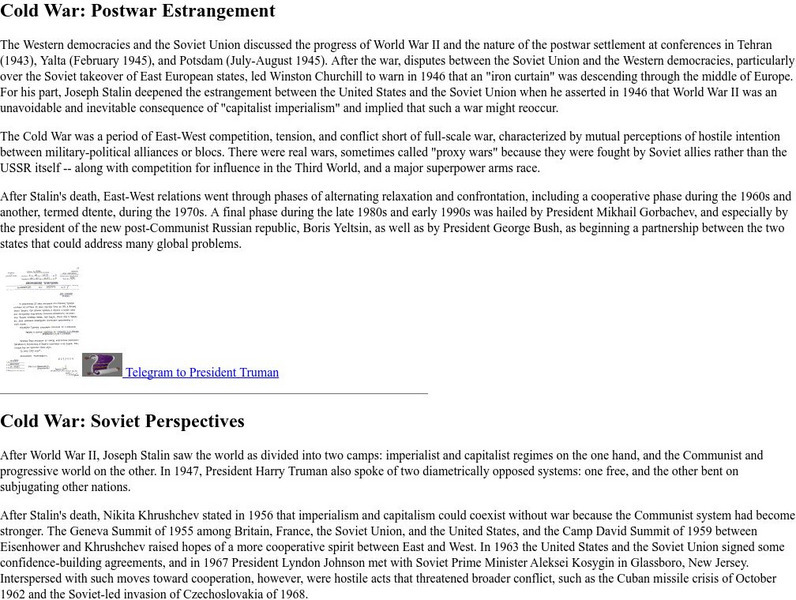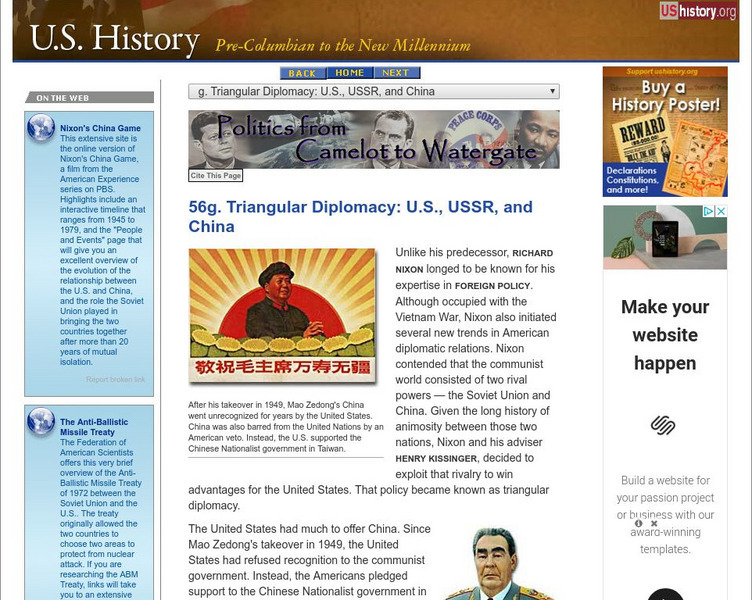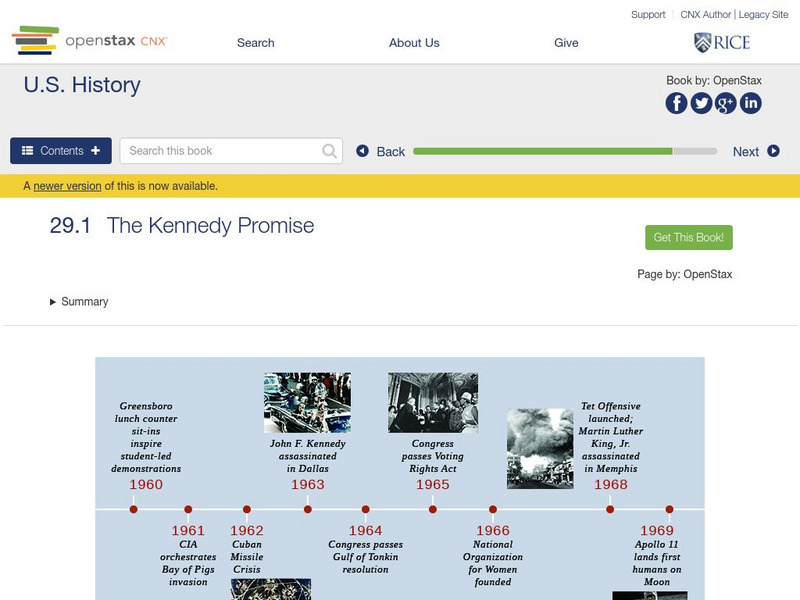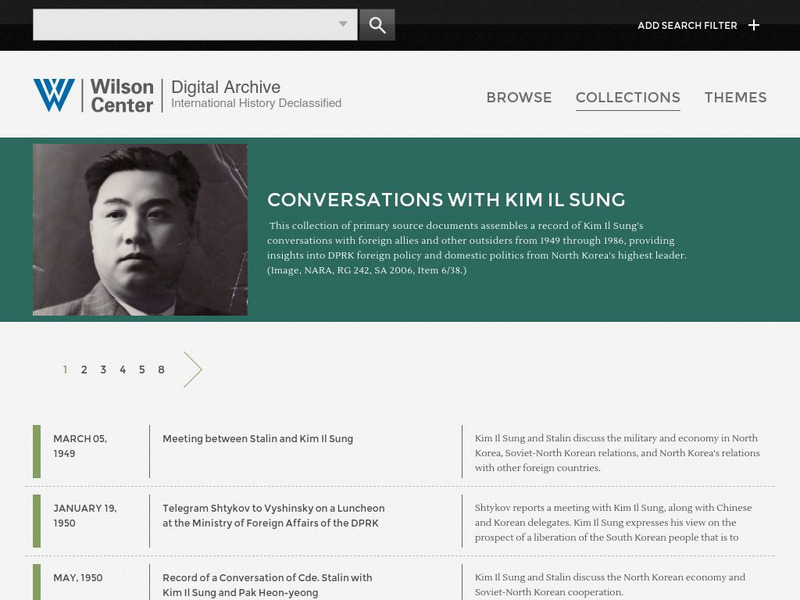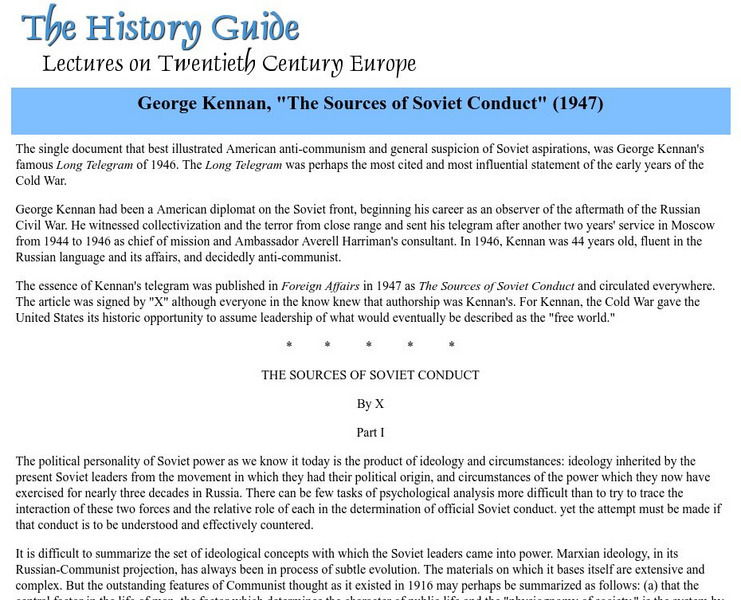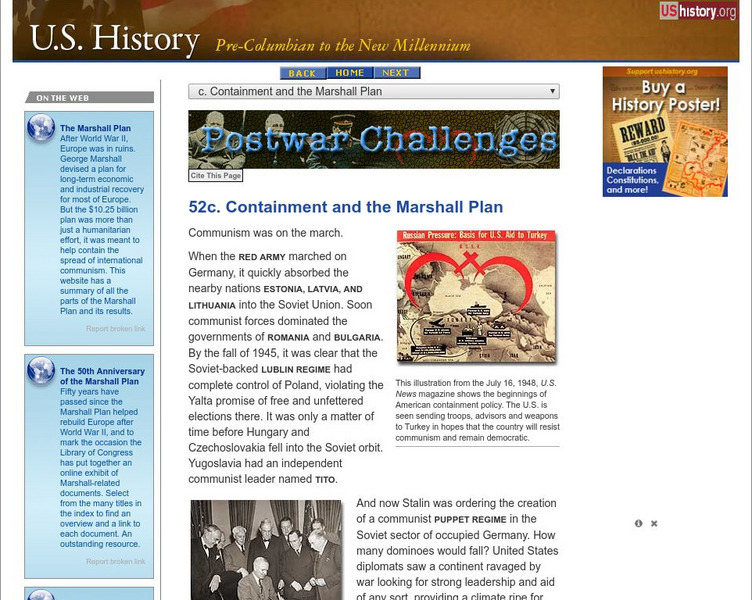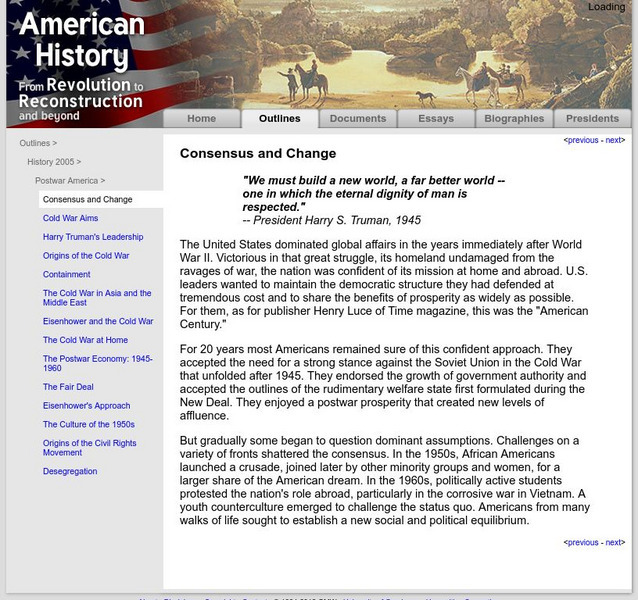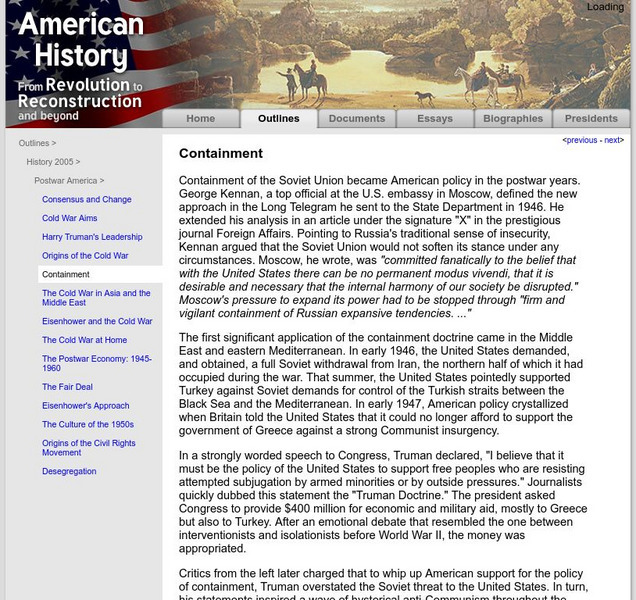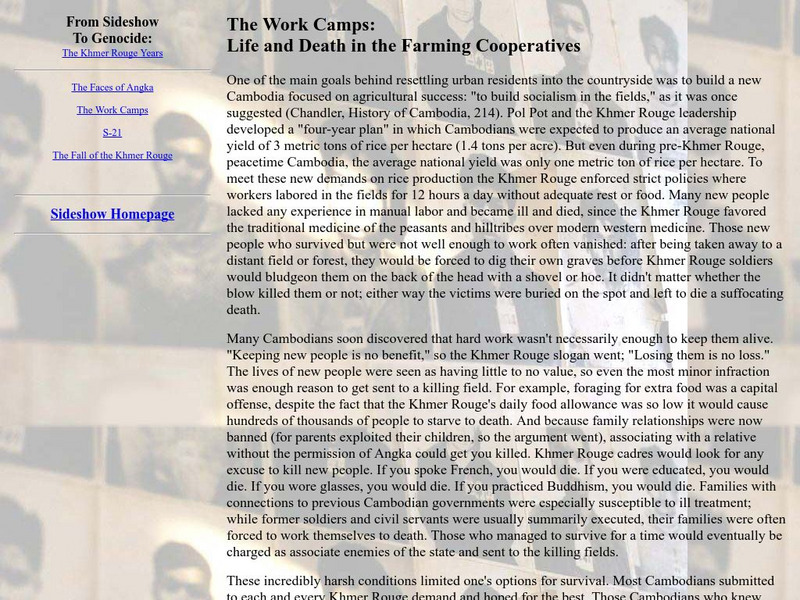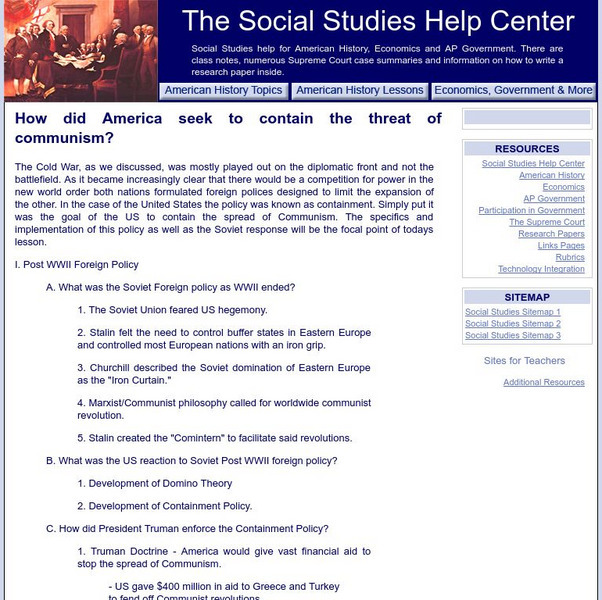US Department of State
Office of the Historian: Foreign Policy Under President Eisenhower
This history from the U.S. Department of State relates the influence that John Foster Dulles, Eisenhower's Secretary of State, had on Eisenhower's Cold War policies.
Department of Defense
Do Dea: Ap Us History: Unit 9: Modern Times
This extensive learning module examines the extent to which conservatism successfully challenged liberal dominance in American culture and politics, and redefined economic policies and political behaviors. It looks at how the end of the...
PBS
Pbs Learning Media: Writing in u.s. History: Shaping the Postwar World
Consider how U.S. foreign policy changed in the aftermath of WWII, and analyze the philosophical, geopolitical, and economic factors that influenced these changes. In this interactive lesson from WGBH, students develop a written argument...
Country Studies US
Country Studies: The War in Vietnam
The Vietnam War encompassed many decades and many presidents. This site from Country Studies provides a brief, yet comprehensive, history of the war in Vietnam.
University of Virginia
Miller Center at Uva: u.s. Presidents: Dwight David Eisenhower: Foreign Affairs
A comprehensive explanation of Eisenhower's Cold War policies.
ibiblio
Ibiblio: Post War Estrangement
This site from Ibiblio.org provides information on the many different aspects of the cold war. Includes information on the Soviet prospective, post-war estrangement, and the Cuban missile crisis.
Smithsonian Institution
National Portrait Gallery: The Presidency and the Cold War: Jimmy Carter
The National Portrait Gallery explores the facets of presidential actions toward the Cold War. Click on Jimmy Carter to watch a short video where he expresses his support for human rights across the world. The end of the video shows the...
Mount Holyoke College
Documents Relating to American Foreign Policy: Cuban Missle Crisis
Links to declassified documents surrounding and responding to Bay of Pigs and the Cuban Missile Crisis. Includes memorandums, statements, public addresses, meeting transcripts, etc.
Independence Hall Association
U.s. History: Tirangular Diplomacy: u.s., Ussr, and China
A discussion about Richard Nixon's foreign policies and his idea of triangular diplomacy where he used the rivalries between the USSR and China for U.S. advantage.
Digital History
Digital History: Postwar America: 1945 1960
Chapter focus on the political, social, and economic events following World War II. Examines both foreign and domestic issues, including the origins of the Cold War and Civil Rights movements.
OpenStax
Open Stax: Contesting Futures: America in the 1960s: The Kennedy Promise
Discusses Kennedy's rise to power and the challenges he faced from within the government, his focus on foreign policy, the conflict with Cuba, American involvement in Vietnam, support for racial equality and civil rights, and Kennedy's...
Woodrow Wilson International Center for Scholars
Woodrow Wilson Center: Digital Archive: Conversations With Kim Il Sung
This collection of primary source documents assembles a record of Kim Il Sung's conversations with foreign allies and other outsiders from 1949 through 1986, providing insights into DPRK foreign policy and domestic politics from North...
PBS
Pbs: American Experience: Eisenhower Foreign Affairs
This PBS American Experience site summarizes the foreign policies set in place and carried out by the Eisenhower Administration.
Steven Kreis, PhD
The History Guide: The Sources of Soviet Conduct
This sums up the ideas of containment. It is a telegram that was widely published.
University of Groningen
American History: Outlines: Presidency of Ronald Reagan
This site provides an extensive history of Reagan's administration including information on his presidential campaign, domestic policies, foreign policies, and domestic and international events of his presidency.
PBS
Pbs News Hour: Essays and Dialogues: George Kennan
Transcript of a NewsHour interview with George F. Kennan (1904-2005), the man credited with articulating the policy of containment that shaped U.S. foreign policy toward communism at the start of the cold war.
Independence Hall Association
U.s. History: Containment and the Marshall Plan
Read about President Truman's two-pronged foreign policy for Europe. Find out about his containment policy and the Truman Doctrine, which was manifested in the Marshall Plan.
New York Times
New York Times: On This Day: Harry S. Truman: Decisive President
A New York Times obituary of Harry S. Truman, which outlines his life as a Senator, Vice-President, and President. Read about his domestic and foreign policy decisions.
University of Groningen
American History: Outlines: Consensus and Change
Brief illustration of the changes in U.S. domestic and foreign policy that occurred following WWII.
University of Groningen
American History: Outlines: Containment
Article outlines the U.S. policy to keep the spread of communism at bay and the Soviets in check.
Internet History Sourcebooks Project
Fordham University: Modern History Sourcebook: Soviet Reaction to Pact
This site from the Fordham University provides a great alternative perspective of the Baghdad Pact and the Central Treaty Organization. This is a statement given by the USSR Ministry of Foreign Affairs on Security in the Near and Middle...
University of Groningen
American History: Presidents: State of Union 1965
Here one finds President Johnson's address to the nation in which he lays out his legislative priorities and his assessment of foreign affairs the early part of his administration.
Other
Ed Web: Work Camps Life and Death in the Farming Co Ops
Describes life on the farms and in the killing fields of the Khmer Rouge.
Social Studies Help Center
Social Studies Help Center: How America Contained the Threat of Communism
This site discusses America's post-World War II foreign policy in outline form.


